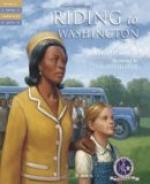A baffling and perverting carnal mesh
Binds it and makes all error: and to KNOW
Rather consists in opening out a way
Whence the imprisoned splendour may escape,
Than in effecting entry for a light,
Supposed to be without.
Browning was, perhaps, somewhat beyond the comprehension of Job Hesketh, but he liked to hear me reading poetry aloud.
“Whativer it is,” he said, “Abe Verity knows all about it. He were allus a better scholar nor me, were Abe, sin first we went to schooil together; but I reckon I’ll know all about it, too, when I’ve slipped t’ leash an’ started work at Heaven Steel Works.”
It was evident that a great change had come over Job’s mind, and that the wonderful vision of a future life that had been granted to him during that second immersion beneath the waves of the North Sea had wholly taken away from him his old fear of death. But I wanted to hear the conclusion of the story, and pressed him to continue.
“Nay,” he said, “there’s noan so mich more to tell. There was summat i’ Abe that made me a bit flaid o’ axin’ him ower mony questions. He were drissed like a plain vesselman, sure enif; but he talked as if he were a far-learnt man, an’ his own maister. I axed him how lang t’ shifts lasted i’ heaven, an’ he said: ‘We work as lang as t’ inner voice tells us to.’ You see ‘twere allus t’ inner voice, an’ I couldn’t hardlins mak out what he meant by that.
“Then a thowt com into my heead, but I didn’t fairly like to out wi’ it, for fear T’ Man Aboon were somewheer about an’ sud hear me. So I just leaned ovver and whispered i’ Abe’s lug:
“‘Doesta tak a day off nows an’ thens an’ run wi’ t’ hounds or t’ harriers?’
“Abe laughed as if he were fit to brust hissen, an’ then, afore he’d time to answer, iverything went as dark as a booit. I saw no more o’ Abe, nor o’ t’ lake, nor o’ t’ birk-trees; an’ t’ next time I oppened my een there were a doctor chap stannin’ ower me wi’ a belly-pump in his hand, an’ I were liggin’ on a bed as weak as a kitlin.”
Job was silent for a while, after finishing his story and relighting his pipe, and his silence gave me a chance of looking at him closely. Physically he was none the worse for his adventure; mentally, spiritually, he was a new man. The fear of death had gone from his eyes, and in its place was the joy of life, together with a sure faith in the triumph of personality when, to use his own coursing phrase, he had slipped the leash. His vision of heaven was somewhat too material to satisfy me, but there could be no doubt that it had brought to his terror-swept soul the peace of mind which passeth all understanding.
After a while Job rose, knocked the ashes from his pipe, and took his leave. I accompanied him to the door and watched him as he walked down the street. There was something buoyant in his tread, and his gigantic shoulders rolled from side to side like a seaman’s on the quarter-deck. Soon he started whistling, and I smiled as I caught the tune. It was one of his chapel hymns, and there was a note of exultation in the closing bars:




